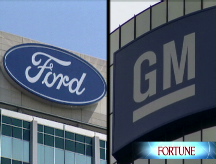Detroit pushes Capitol Hill for bailout
The Big Three meet with Pelosi and Reid to discuss industry's dim outlook and a possible bailout as GM and Ford face quarterly losses.
NEW YORK (CNNMoney.com) -- The heads of the three leading U.S. automakers met with the congressional leaders Thursday to discuss a possible bailout - one day before General Motors and Ford Motor are expected to report sizable quarterly losses and reveal painful cost-cutting measures.
Executives with knowledge of the meetings said they focused on preliminary discussions about what was at stake if one or more automakers fail. The meetings also included Ron Gettelfinger, president of the United Auto Workers union.
"The industry needs time and it needs money and it has neither at this point. That's the purpose of meeting," said one executive.
Among the topics discussed were a $25 billion loan to fund union-controlled trust funds that would be set up in the coming year to cover the health care costs of retirees and their family members. Shifting about $100 billion of those costs from the automakers' balance sheet to the trust funds was a key concession the companies won from the UAW in the 2007 labor deals.
The discussions also touched upon allowing the automakers to tap into the $700 billion bailout of Wall Street firms and the nation's banks that was passed by Congress last month. Treasury has so far rejected auto-industry inquiries about accessing that pool of money.
The automakers also renewed their pre-election request to double the $25 billion low-interest loan program approved by Congress, as part of energy legislation, to help automakers convert to making more fuel-efficient vehicles in an effort to meet the demands of car buyers and new federal rules.
But despite the range of ideas discussed, an executive with knowledge of the discussions said most of Thursday's talks dealt in broad outlines, not details.
The industry officials first met with House Speaker Nancy Pelosi, D-Calif, then with Senate Majority Leader Harry Reid, D-Nev. Both have said they are open to additional federal help for the automakers.
"It is essential that we preserve our manufacturing and technology base in this country," said Pelosi, in a prepared statement released by her office following the meeting.
"Today, the Democratic leadership discussed how to protect hundreds of thousands of workers and retirees, safeguard the interests of American taxpayers, and use cutting-edge technology to transform blue-collar jobs to green collar jobs for generations to come," she said.
Rep. John Dingell, D-Mich, one of the industry's strongest allies on the Hill, voiced support for offering federal help to the automakers, following the Thursday evening meeting with Pelosi.
"They are not seeking cash just to spend it," Dingell said. "They are seeking money to invest in jobs and opportunity for American workers and American industry."
One auto executive said it is not yet clear if the industry will seek help during an expected lame-duck session of the outgoing Congress later this year or if it will wait for the new Congress and President-elect Barack Obama to take office in January.
Sources also said the automakers are pushing back product development plans in an attempt to save cash. The move is a desperate one, as it hurts their plans to roll out the more fuel-efficient models they need to reignite sales. But they say they have no choice in the current environment.
"Everyone's having to do it," said another executive at a U.S. automaker who spoke on the condition his name not be used. "[Sales have] fallen off a cliff. These are far from normal slow times. We need to do what we're doing in the short-term to address that."
Both GM and Ford Motor are likely to discuss product development plans Friday when they report their financial results, according to sources.
Analysts surveyed by earnings tracker Thomson Reuters forecast that GM lost $3.51 a share in the quarter, or about $1.9 billion. Ford is expected to report a loss of 93 cents a share, or $2.2 billion.
These losses exclude special items. And with the companies looking at possible further cuts in production and payroll, there could be other charges that send losses even higher.
The situation is clearly dire for Detroit's Big Three - GM, Ford, and privately held Chrysler. Their Asian rivals have been struggling as well.
Toyota slashed its annual earnings forecast Thursday, saying profits will fall to less than a third of what they were the previous fiscal year. The Japanese auto giant will also post its first annual decline in U.S. sales since it became a major player here. The United States is now Toyota's largest market.
Automakers reported the worst month of auto sales in 25 years in October and sales are expected to remain weak into next year due to tight credit for consumers and dealers, rising job losses nationwide and battered consumer confidence.
The crisis in the auto sector has prompted talk about a possible GM-Chrysler merger, one which would lead to the loss of tens of thousands of jobs and further factory closings. Those talks appear to be on hold at the moment, though.
There had been talk that GM and Chrysler would need federal loans if they were to try to complete a deal. But one of the auto executives said it was unlikely the possibility of a merger was discussed at Thursday's meeting.
Shares of GM (GM, Fortune 500) fell 14% Thursday, while Ford (F, Fortune 500) ended down 5%. Toyota's (TM) stock dropped 13%. ![]()


